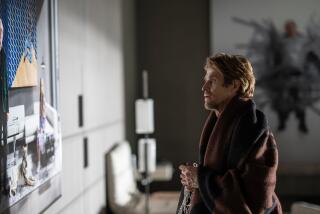Making Art a Crime
Steven Kurtz’s legal nightmare began in grief last month when he awoke at his Buffalo, N.Y., home to find his wife of 20 years unresponsive. The art professor called 911 to summon paramedics, who determined that Hope Kurtz had died in her sleep of heart failure. One of the paramedics noticed laboratory equipment and petri dishes in Kurtz’s home.
Fearing they had stumbled onto a clandestine bioweapons lab, the paramedics called in local health department officials. Tests found that the lab equipment and the E. coli bacteria in Kurtz’s home posed no danger, but the professor’s trouble had only started. Justice Department lawyers are expected to argue to a federal grand jury in Buffalo today that what Kurtz viewed as artistic expression was a national security threat and that he should be indicted under the Patriot Act.
Kurtz, a University of Buffalo professor, is part of the Critical Arts Ensemble, an internationally recognized collective of artists focusing on “the intersections between art, technology, radical politics and critical theory.” Some of his equipment and bacteria were part of an ensemble exhibit called “Gen Terra,” which explores the consequences of genetic engineering. That show had traveled around the country for two years.
Kurtz explained this to the panicked public health inspectors who converged at his home and again to the FBI agents and the suited-up FBI hazardous material team that the agents called. No matter. They carted off the equipment from Kurtz’s exhibit along with his computer, books and papers. None of that material has been returned.
Kurtz is not the only artist whose work is provocative and biological. A 1993 exhibit by the British artist Damien Hirst that included a sliced-down-the-middle cow preserved in formalin generated storms of controversy. Similarly, “Gut Reflections. Israel. Palestine. 2002,” by Israeli artist Adi Yekutieli, incorporates molds of the artist’s body parts filled with raw cow guts to convey an emotional response to the Mideast conflict.
What sets Kurtz apart is that the U.S. attorney in Buffalo is pushing to prosecute him under a Patriot Act provision that bars possession of “any biological agent, toxin or delivery system ... not reasonably justified by a prophylactic, protective, bona fide research or other peaceful purpose.”
The effort to paint Kurtz as a bioterrorist in the making would be funny if it wasn’t so frightening. Federal officials in Buffalo have been in hair-trigger mode since six Yemeni American men from nearby Lackawanna pleaded guilty in recent months to charges that they attended an Al Qaeda training camp in Afghanistan in the spring of 2001. But given the bacteria test results, Justice Department lawyers should never have brought the Kurtz case to the grand jury.
Using the Patriot Act to muzzle lefty art professors defies common sense, not to mention the Constitution. The grand jurors should tell the Justice Department to get lost.
More to Read
The biggest entertainment stories
Get our big stories about Hollywood, film, television, music, arts, culture and more right in your inbox as soon as they publish.
You may occasionally receive promotional content from the Los Angeles Times.








